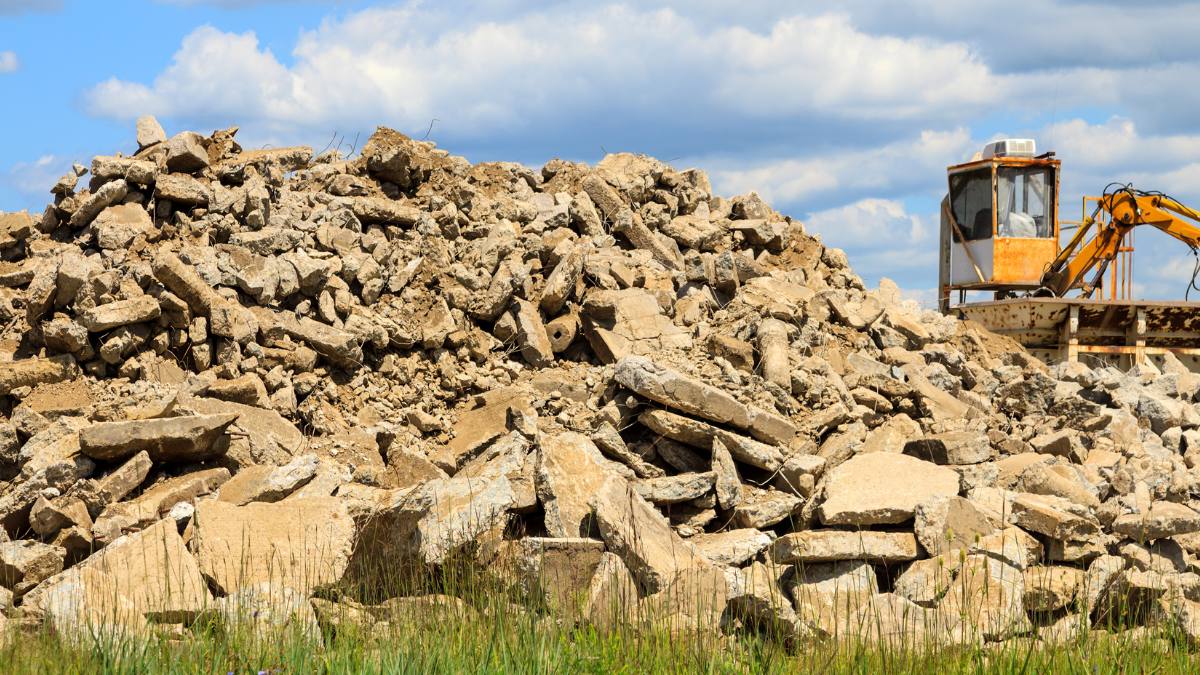It is no secret that concrete is one of the most widely used materials in construction projects. However, many people may not be aware of the fact that concrete is also recyclable.
Yay! That’s great for the environment.
This article will explore the process of concrete recycling, its potential benefits, and how this could be a great way to reduce construction waste.
Recycling Concrete: Benefits and Challenges
Recycling concrete has become an increasingly important issue in the construction industry. Not only is it an environmentally friendly practice, but it also provides cost savings and reduces the amount of waste generated by construction projects.
While there are many benefits to recycling concrete, there are also some challenges that must be addressed.
Benefits of Recycling Concrete
The most significant benefit of recycling concrete is the environmental impact. Concrete is one of the most widely used materials in construction and demolition, and the reuse of concrete can significantly reduce the amount of waste that ends up in landfills.
Additionally, the energy used to produce new concrete can be reduced when concrete is recycled.
Recycling concrete can also provide cost savings for construction projects. The cost of purchasing new materials can be reduced, as well as the cost of transporting the materials.
The cost of labor can also be reduced when recycled concrete is used, as it eliminates the need to manually break down and haul away the material.
Finally, the reuse of concrete can improve the quality of the finished product. Recycled concrete is often stronger and more durable than new concrete, and can be used in a variety of applications.
Challenges of Recycling Concrete
One of the main challenges of recycling concrete is the fact that it is difficult to separate the concrete from other materials that may be mixed in with it. This can create a challenge when it comes to sorting and cleaning the material.
If the concrete is contaminated with other materials, like dirt, it can make the recycled material unsuitable for use. Contamination can also cause problems for the recycling process, as the contamination has to be removed before the recycling process can begin.
Besides that, the process of crushing concrete can be labor-intensive and time-consuming.
Another challenge is the fact that concrete is a highly alkaline material, which can cause corrosion of metals when mixed with other materials. This means that care must be taken when storing and handling the material, as well as when it is being reused in construction projects.
While there are cost savings associated with using recycled concrete, there is also the cost of collecting, sorting, and transporting the material. This cost can be significant and must be taken into consideration.
For those looking to make money off reused concrete, there can be a limited market. Not all projects require the use of recycled concrete, and it can be difficult to find buyers for recycled material. This can make it difficult to make a profit.
Environmental Benefits of Recycling Concrete
Recycling concrete is becoming an increasingly popular way to reduce the environmental impact of building and construction projects. With the proper technology and techniques, concrete from old structures can be recycled into new building materials and used again in new construction. The many environmental benefits of recycling concrete include:
Reduced Landfill Waste: Once the concrete has been crushed and processed, it can be used to make new material, eliminating the need for disposal in landfills. This reduces the amount of waste that needs to be disposed of, which in turn reduces the environmental impact of landfills.
Reduced Air Pollution: Recycled concrete does not require the burning of fossil fuels. This reduces emissions of air pollutants such as nitrogen oxides, sulfur dioxide, and carbon dioxide, which are linked to smog and climate change.
Reduced Water Pollution: When concrete is recycled, it eliminates the need for producing new material. This means that fewer pollutants are released into waterways, reducing the risk of water pollution.
Reduced Energy Consumption: Recycling concrete requires less energy than producing new. This decreases the amount of energy used in construction projects, which reduces the overall carbon footprint.
By taking advantage of these environmental benefits, we can help to reduce our reliance on landfills and protect our environment.
Process of Recycling Concrete and How the Material is Reused
The process of recycling concrete begins with the collection of used materials from demolition sites. This material is then crushed and sorted into different sizes, depending on the intended use.
Smaller pieces of concrete can be used as fill material for road construction or as an aggregate for new concrete. Larger pieces can be used for structural purposes or as a base for new roads and structures.
Once the concrete has been sorted and processed, it is ready for reuse. Concrete can be combined with other materials to create a new product. For example, it can be mixed with asphalt to create a new road surface or it can be combined with plastic to create new concrete blocks.
Conclusion
Recycling concrete can be a great way to reduce waste and create a more sustainable future. However, it is important to note that there are some challenges associated with the process. It is important to consider both the benefits and the challenges of recycling concrete before making any decisions.
